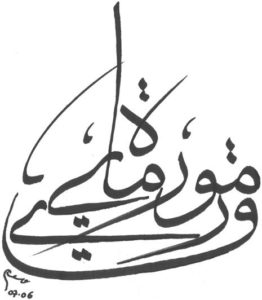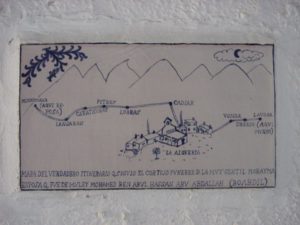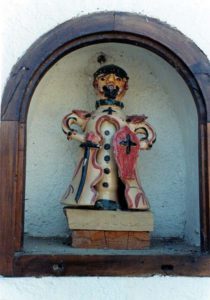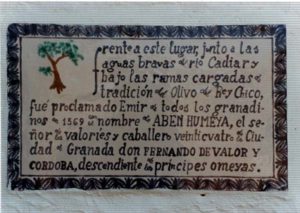ALQUERÍA MORAYMA:

Ali Atar, spice merchant and famous general, through his great exploits, gained the highest honors of the Nazari kingdom. Mayor of Loja, Lord of Xagra, first (Primer) Steward of the Alhambra and Governor of the Kingdom of Granada. His highest aspirations came true when his daughter, Morayma, at the age of 15, married Boabdil, heir to the Alhamar throne.
Although exceedingly rich, he lived a frugal life, dedicating his income to the defense of the kingdom. “As an example of the patriotism and sacrifices made by this rich mayor” says historian Lafuente Alcántara, “suffice it to say that both the jewellery and the dress worn by his daughter Morayma at her wedding were borrowed”.
A chronicler who attended the wedding banquet explains that the bride wore a black cloth petticoat and shawl and a white headdress which almost covered her face. “It’s a pity”, he says “for her features are beautiful and seductive”. A muslim poet declares that Morayma had large and expressive eyes on an altogether admirable face and, he conjectures, “through the thick clothes you could guess at shoulders, arms, hips and waist of classically opulent proportions”.

Historians later referred to her as “tender Morayma” and as the ” suffering wife of Boabdil”. Fidel Fernández says that “few women have been as unfortunate as she”. A few days after the wedding, muley Hacen jails his son Boabdil and “brutally separates his young wife from him” confining her to a Carmen (large house with a garden) near the Cuesta del Chapiz.
After the battle of Lucena, where Ali Atar died and Boabdil was captured, Morayma and her son Ahmed, then just one year old, retire once again to the Carmen, where she suffers “the long months of her husband’s captivity in Porcuna”. Finally, the Castilians free Boabdil who has agreed, among other conditions, to hand over his son as ransom. Ahmed, who had just turned two, won’t be returned to his mother until Granada is surrendered. By then he is nine years old, doesn’t speak arabic, follows the Christian religion and is known as “El Infantico” (The young Prince), a nickname given to him by Queen Elizabeth.

Morayma will return twice alone to the Carmen in the Albayzin and again once more with her husband while they await their exile in Andarax Manor, in the Alpujarra mountains, assigned to them by the Christians.
“Now that you have no kingdom, take refuge in your wife’s bosom”, said Aixa Fátima to her son, but Morayma, “dethoned without ever having tasted the pleasures of the throne”, says one historian, could only offer boabdil her unrelenting devotion, remembering the Carmen where she had been so unhappy.
From this place, el Mirador de la Esperanza (Lookout of Hope), Morayma used to spend long hours contemplating the palace of the Alhambra, where she was once queen if only for a very short time.
They moved to Andarax and there they remained until the Castilians, recating once again on their agreements, decided to expel them from Spain. This happened “after the heat of the summer of 1493 subsided”. Thus, in October, boabdil, his mother Fátima, his sister, his son Ahmed and Yusef together with a small retinue, left from the harbour at Adra towards Africa. Morayma “the only woman Boabdil was Known to have loved”, says one chronicler, “the only being who could have made the suffering of his exile bearable”, died a few days before leaving the Alpujarras.
And she was buried in the Mosque of Mondújar, the cemetery where the remains of the Sultans Mohammad II, Yusef I, Yusef III, and Abu Saad had been moved from the Alhambra, at it is recorded on page 28 of the Apeo Book (1577), the official register of the place. The body of Morayma was taken to Mondújar so that she could rest in peace with the Nazari Kings. Boabdil ordered the relocation of certains properties to the Alphaqui of Mondújar so that he could pray twice a week on Morayma`s tomb. He also gave the Ulemas an important payment, so that they would pray every day for his wife in the Mosque (according to the Lawsuit between the church of the town and Giomar de Acuña, heir of Mr. Pedro de Zafra, Major of Mondújar in the year of 1500. The manuscript is kept in the general archives of the Archbishop of Granada.)

“Soon after Boabdil had embarked for his exile in Morocco”, says Fidel Fernández, “the Christians confiscated all the allowances allocated for Morayma`s Prayers. These funds were used for the construction of a church based an the grounds of the mosque, which they didn’t have objection in demolishing.” The last sorrow in the memory of Morayma whose corpse traveled in the utmost secretly, through the subordinated valleys, from the Prison in the Alpujarra (the old Cobdaa), through Alquería, to Mondújar.
Francisco Izquierdo, Poeta Granadino

